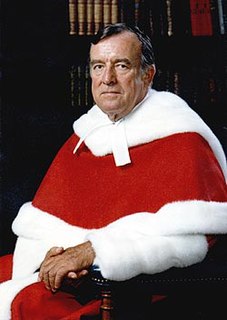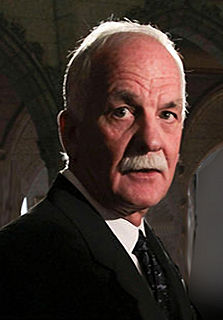Related Research Articles

The Supreme Court of Canada is the highest court in the judicial system of Canada. It comprises nine justices, whose decisions are the ultimate application of Canadian law, and grants permission to between 40 and 75 litigants each year to appeal decisions rendered by provincial, territorial and federal appellate courts. The Supreme Court is bijural, hearing cases from two major legal traditions and bilingual, hearing cases in both official languages of Canada.

Robert George Brian Dickson was a Canadian lawyer, military officer and judge. He was appointed a puisne justice of the Supreme Court of Canada on March 26, 1973, and subsequently appointed the 15th Chief Justice of Canada on April 18, 1984. He retired on June 30, 1990.

Andrew James Swan is a politician in Manitoba, Canada. He served in the Legislative Assembly of Manitoba from 2004 to 2019. He was first elected in a 2004 by-election, replacing MaryAnn Mihychuk, who resigned to run for Mayor of Winnipeg.

Victor Toews is a Paraguayan-Canadian politician and jurist. Toews is a judge of the Court of King's Bench of Manitoba. He represented Provencher in the House of Commons of Canada from 2000 until his resignation on July 9, 2013, and served in the cabinet of Prime Minister Stephen Harper, most recently as Minister of Public Safety. He previously served in the Legislative Assembly of Manitoba from 1995 to 1999, and was a senior cabinet minister in the government of Gary Filmon. Prior to his appointment to the judiciary, Toews was a member of the Conservative Party of Canada.

Albert Clements Killam, was a Canadian lawyer, politician, judge, railway commissioner, and Puisne judge of the Supreme Court of Canada. He was the first judge from Western Canada to be appointed to the Supreme Court.
The Manitoba Court of Appeal is the court of appeal in, and the highest court of, the Canadian province of Manitoba. It hears criminal, civil, and family law cases, as well as appeals from various administrative boards and tribunals.
Marshall Rothstein is a former Puisne Justice of the Supreme Court of Canada.
Nathan Nurgitz was a Canadian lawyer, judge, and Senator.
The Court of King's Bench of Manitoba —or the Court of Queen’s Bench of Manitoba, depending on the monarch—is the superior court of the Canadian province of Manitoba.
Alan D. MacInnes, formerly a judge of the Court of Queen's Bench of Manitoba, was appointed to the Manitoba Court of Appeal on June 22, 2007. He replaced Glenn Joyal, who was appointed a judge of the Court of Queen's Bench.
Douglas N. Abra is a Canadian judge. He was appointed a judge of the Court of King's Bench of Manitoba on July 10, 2007. He replaced Alan D. MacInnes, upon his appointment to the Manitoba Court of Appeal.
A. Lori Douglas was the Associate Chief Justice of the Court of Queen's Bench of Manitoba. She currently lectures and practices family law part-time.
Karen I. Simonsen was appointed a judge of the Court of Queen's Bench of Manitoba on December 10, 2004. She replaced Mr. Justice Marc Monnin, who was appointed Chief Justice.
Manitoba Justice, or the Department of Justice, is the provincial government department responsible for administering the Crown Law justice systems in the province of Manitoba.

The Taney Court refers to the Supreme Court of the United States from 1836 to 1864, when Roger Taney served as the fifth Chief Justice of the United States. Taney succeeded John Marshall as Chief Justice after Marshall's death in 1835. Taney served as Chief Justice until his death in 1864, at which point Salmon P. Chase took office. Taney had been an important member of Andrew Jackson's administration, an advocate of Jacksonian democracy, and had played a major role in the Bank War, during which Taney wrote a memo questioning the Supreme Court's power of judicial review. However, the Taney Court did not strongly break from the decisions and precedents of the Marshall Court, as it continued to uphold a strong federal government with an independent judiciary. Most of the Taney Court's holdings are overshadowed by the decision in Dred Scott v. Sandford, in which the court ruled that African-Americans could not be citizens. However, the Taney Court's decisions regarding economic issues and separation of powers set important precedents, and the Taney Court has been lauded for its ability to adapt regulatory law to a country undergoing remarkable technological and economic progress.

The Robson Hall Faculty of Law is the law school of the University of Manitoba located in Winnipeg, Manitoba, Canada. It is on the university's Fort Garry campus.
Sweatman is a surname.
Thompson Dorfman Sweatman LLP (TDS) is a Canadian, Manitoba-based law firm with its head office in Winnipeg. The firm has two full-time regional office in Brandon and Portage la Prairie and eight part-time satellite offices in Boissevain, Gladstone, MacGregor, Morden, Neepawa, Saskatoon, Steinbach, and Winkler.
Isaac Campbell, was a lawyer and political figure in Manitoba. He represented Winnipeg South from 1888 to 1891 in the Legislative Assembly of Manitoba as a Liberal.
Irwin Dorfman,, was a Canadian lawyer from Winnipeg, Manitoba, eventually becoming senior counsel with the firm of Thompson Dorfman Sweatman. In addition to a busy legal practice in the areas of taxation and corporate matters, he was active in his community and in the profession. He served as President of the Law Society of Manitoba and as the national President of the Canadian Bar Association, the first Jewish president in the Association's history.
References
Footnotes
- 1 2 3 Thompson Dorfman Sweatman 2012, p. 43.
- ↑ Rice, Bueckert & Schroeder 2012, p. 41.
- ↑ MacPherson 2012, p. 1.
- ↑ Fuller, Simon (March 7, 2012). "City Preparing to Mark 40th Anniversary of Amalgamation". The Herald. Winnipeg, Manitoba: Canstar Community News. Retrieved August 24, 2016.
- 1 2 3 Rollason, Kevin (February 14, 2013). "Appeal Court's Chief Justice Retiring 'Early'". Winnipeg Free Press. p. A10. Retrieved August 24, 2016.
- 1 2 3 "Richard J. Scott, LL.D., May 31, 2000". University of Manitoba. Retrieved August 24, 2016.
- ↑ "Court of Appeal Chief Justices". Manitoba Courts. Retrieved August 24, 2016.
- ↑ Thompson Dorfman Sweatman 2012, pp. 39, 43.
- 1 2 "Prime Minister Announces New Supreme Court of Canada Judicial Appointments Process – Biographical Notes on Members of the Independent Advisory Board for Supreme Court of Canada Judicial Appointments" (Press release). Ottawa: Government of Canada. August 2, 2016. Retrieved August 24, 2016.
- 1 2 3 Goldsborough, Gordon (2016). "Judges of Manitoba". Memorable Manitobans. Manitoba Historical Society. Retrieved August 24, 2016.
- ↑ Rice, Bueckert & Schroeder 2012, p. 61.
- ↑ Shaffer 1997, p. 2.
- ↑ Devlin 2011, p. 290.
- ↑ Rice, Bueckert & Schroeder 2012, pp. 41, 46.
- ↑ Rice, Bueckert & Schroeder 2012, p. 46.
- ↑ Rice, Bueckert & Schroeder 2012, p. 46; Steinfeld 2012, pp. 330, 332.
- ↑ Steinfeld 2012, pp. 330–331.
- ↑ Steinfeld 2012, p. 331.
- ↑ Rice, Bueckert & Schroeder 2012, p. 46; Steinfeld 2012, p. 331.
- ↑ Steinfeld 2012, p. 332.
- ↑ Rice, Bueckert & Schroeder 2012, p. 47.
- ↑ Rice, Bueckert & Schroeder 2012, p. 48.
- ↑ Rabson, Mia (August 2, 2016). "Manitobans Will Help Choose Supreme Court Justice". Winnipeg Free Press. Retrieved August 25, 2016.
- ↑ "Lawyers". Hill Sokalski Walsh Olson LLP. Retrieved August 25, 2016.
- ↑ "Prime Minister Announces Advisory Board to Select Next Supreme Court Justice" (Press release). Government of Canada. July 17, 2017.
- ↑ MacCharles, Tonda (June 12, 2017). "Chief Justice Beverley McLachlin to Retire from Supreme Court of Canada". Toronto Star.
- ↑ "Office of the Commissioner for Federal Judicial Affairs Canada – Terms of Reference of the Advisory Board". Government of Canada. Retrieved July 19, 2017.
Bibliography
- Devlin, Richard F. (2011). "From Archetypes to Architects: Re-envisioning the Role Morality of Trial Level Judges". UBC Law Review. 43 (2): 277–310. ISSN 0068-1849. SSRN 2101770.
- MacPherson, Darcy L. (2012). "An Interview with Chief Justice Richard J. Scott" (PDF). Manitoba Law Journal. 36 (special issue): 1–29. ISSN 0076-3861 . Retrieved August 24, 2016.
- Rice, Michael E.; Bueckert, Melanie R.; Schroeder, Ainslie (2012). "'A Lawyer with a Whistle': The Jurisprudence of Chief Justice Richard J. Scott" (PDF). Manitoba Law Journal. 36 (special issue): 31–66. ISSN 0076-3861. Archived from the original (PDF) on October 13, 2016.
- Shaffer, Martha (1997). "The Battered Woman Syndrome Revisited: Some Complicating Thoughts Five Years After R. v. Lavallee". University of Toronto Law Journal. 47 (1): 1–33. doi:10.2307/826013. ISSN 1710-1174. JSTOR 826013.
- Steinfeld, Dayna M. (2012). "Leveling the Playing Field: Severance and Access to Justice at the Manitoba Court of Appeal" (PDF). Manitoba Law Journal. 36 (1): 329–340. ISSN 0076-3861 . Retrieved August 25, 2016.
- Thompson Dorfman Sweatman (2012). "Thompson Dorfman Sweatman LLP, 1887–2012: A Short History" (PDF). Winnipeg, Manitoba: Thompson Dorfman Sweatman LLP. Archived from the original (PDF) on August 26, 2016.